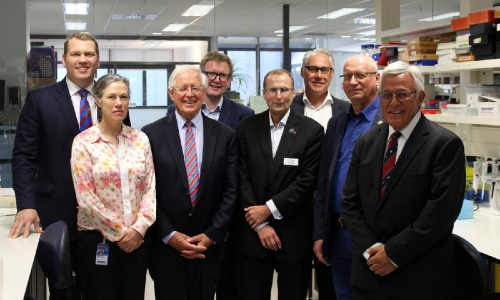Press Releases
Concussion Legacy Foundation Global Brain Bank partners with University of Auckland in New Zealand

Concussion Legacy Foundation will collaborate with University of Auckland’s Centre for Brain Research to advance global CTE research
(Auckland) – Leaders from the Concussion Legacy Foundation (CLF) visited New Zealand this week to announce that the University of Auckland has joined the CLF Global Brain Bank, a network of academic research centers that collaborate with CLF to study Chronic Traumatic Encephalopathy (CTE) and other effects of sports-related brain trauma.
The newly launched New Zealand Sports Human Brain Bank Initiative will be part of the University of Auckland’s Centre for Brain Research, led by internationally recognized neuroscientist, Distinguished Professor Sir Richard Faull.
“We are thrilled that Dr. Faull and the impressive team at the University of Auckland Center for Brain Research are joining the fight against CTE,” said Chris Nowinski, Ph.D., co-founder and CEO of the Concussion Legacy Foundation. “It is fast becoming clear CTE is a global problem, and CLF is committed to recruiting top scientists to collaborate for a cure.”
The Centre for Brain Research was established in 2009 and is home to New Zealand’s only human brain bank. The new extension to the brain bank will collect from donors who have played contact sports like rugby, boxing, soccer, and others, whether or not they have experienced a concussion or traumatic brain injury (TBI), to scientifically research how head impacts in sports influence brain health and brain disease.
“With a large focus on contact sports in our culture, it’s important that New Zealand is part of this global conversation and that our sports people are included and have access to relevant research results,” said Sir Richard Faull.
The CLF Global Brain Bank was launched in March 2018 with the Australian Sports Brain Bank at the University of Sydney’s Brain and Mind Centre and Royal Prince Alfred Hospital. In October 2018, the University of São Paulo Biobank for Aging Studies became the CLF Global Brain Bank’s exclusive collaborator in Brazil.
The mission of the CLF Global Brain Bank is to accelerate research by activating the global scientific and sports communities in the fight to understand, prevent, treat, and eventually cure CTE and other trauma-related brain diseases. The CLF Global Brain Bank is modeled off the success of CLF’s collaboration in the United States (US) with Boston University (BU) and the US Department of Veterans Affairs (VA), which has become the world’s largest CTE brain bank. The VA-BU-CLF Brain Bank research team, led by Dr. Ann McKee, has diagnosed more than 400 cases of CTE in the U.S.
Members of the CLF Global Brain Bank commit to collaborative research, including using common study methods, common data elements, and sharing data. Brain tissue will be stored and made available to outside researchers.
“The Australian Sports Brain Bank looks forward to collaborating with our New Zealand colleagues at the New Zealand Sports Human Brain Bank Initiative,” said Dr. Michael Buckland, director of the Australian Sports Brain Bank, who was also in New Zealand for the announcement. “I hope that by working together we can make a uniquely Antipodean contribution to international collaborative efforts to understand, treat and prevent CTE”.
Dr. Buckland announced this week that more than 200 people have pledged their brain to the Australian Sports Brain Bank, which has now received nine brain donations and completed analysis on four cases.